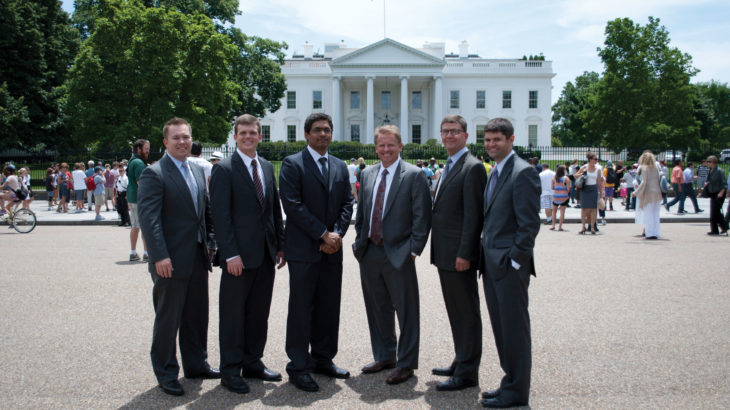Navillum, a team of three M.B.A. students and three researchers from the University of Utah, won the People’s Choice Award at the National Clean Energy Business Plan Competition, which concluded June 13 with an awards ceremony at the White House. About 300 teams from across the country competed in the inaugural competition sponsored by the Department of Energy, and six team advanced to the finals after winning their regional competitions.
The Utah team won the People’s Choice Award by capturing the most votes during several weeks of online voting. It was one of just three awards presented at the White House.
“The People’s Choice Award represents all the local support we had in Utah from alumni to students to the entire community,” said Ryan Tucker, one of the M.B.A. students on the team. “The win also reflects peoples’ interest in nanocrystal technology and the benefits it will provide in electronic displays and solar energy.”
Navillum is based on an invention by Department of Chemistry Post Doctoral Fellow Jacqueline Siy-Ronquillo. She developed a technology for more efficiently producing different types of semiconductor nanocrystals, such as quantum dots. Quantum dots are tiny semiconductors that can emit different colors of light. They can be used to improve the color and efficiency of computer displays, to improve the efficiency of solar panels, and to make lights more efficient.
Other M.B.A. students on the Navillum team include Chris Lewis and Ameya Chaudhari. Besides Siy-Ronquillo, the scientific team consists of University of Utah Department of Chemistry Associate Professor Michael Bartl and University of Utah School of Medicine M.D./Ph.D. candidate Nikko Ronquillo.
“The competition was very educational for us,” said Nikko Ronquillo, co-founder of Navillum. “We came in as a very early startup company, and we expected to be up against very good competition. This experience was invaluable as a future entrepreneur.”
Other universities in the finals included MIT, Stanford, Northwestern, Central Florida and Columbia. The Northwestern team, called NuMat, won the grand prize with a business plan to develop a new technology for storing natural gas. The runner-up was SolidEnergy from MIT, which had a technology for making batteries more compact and efficient.
Navillum advanced to the national finals after winning first place and $100,000 at the regional event in Boulder, Colo. The team has received an additional $144,000 in grants from the university and the state of Utah.
The University of Utah students and researchers came together through the Lassonde New Venture Development Center, which is managed by the David Eccles School of Business and allows graduate students to write business plans for faculty inventors. Navillum is one of dozens of startup companies that have benefited from this unique and nationally recognized program.
“The team did an incredible job at the competition,” said Troy D’Ambrosio, the director of the Lassonde Center and a mentor to Navillum. “Advancing to the finals of this event shows how students at the University of Utah can compete against any university in the country. We have exceptional students and faculty and look forward to many more accomplishments like this one.”
The National Clean Energy Business Plan Competition aims to promote entrepreneurship in clean energy technologies that will boost American competitiveness, bring cutting-edge clean energy solutions to the market, and strengthen our economic prosperity. Each university team identified a promising clean energy technology from a university or national lab and created a business plan around the technology that detailed how they could help bring it to market. This includes financing, product design, scaling up production and marketing.
Learn more about the Lassonde Center at www.lassonde.utah.edu. More information on the National Clean Energy Business Plan Competition can be found at http://bit.ly/Kpk6w5.



